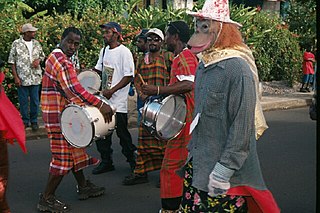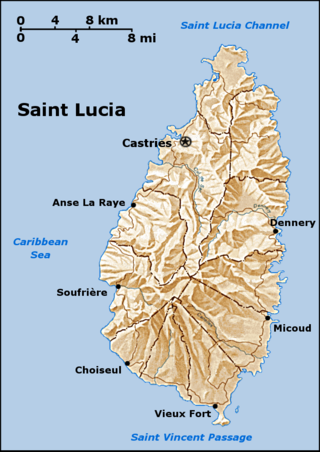Related Research Articles
The music of Martinique has a heritage which is intertwined with that of its sister island, Guadeloupe. Despite their small size, the islands have created a large popular music industry, which gained in international renown after the success of zouk music in the later 20th century. Zouk's popularity was particularly intense in France, where the genre became an important symbol of identity for Martinique and Guadeloupe. Zouk's origins are in the folk music of Martinique and Guadeloupe, especially Martinican chouval bwa, and Guadeloupan gwo ka. There's also notable influence of the pan-Caribbean calypso tradition and Haitian kompa.
The music of Guadeloupe encompasses a large popular music industry, which gained in international renown after the success of zouk music in the later 20th century. Zouk's popularity was particularly intense in France, where the genre became an important symbol of identity for Guadeloupe and Martinique. Zouk's origins are in the folk music of Guadeloupe and Martinique, especially Guadeloupan gwo ka and Martinican chouval bwa, and the pan-Caribbean calypso tradition.

The music of Dominica includes a variety of genres including all the popular genres of the world. Popular music is widespread, with a number of native Dominican performers gaining national fame in imported genres such as calypso, reggae, soca, kompa, zouk and rock and roll. Dominica's own popular music industry has created a form called bouyon, which combines elements from several styles and has achieved a wide fanbase in Dominica. Groups include WCK, Native musicians in various forms, such as reggae, kadans (Ophelia Marie, and calypso, have also become stars at home and abroad.
The music of the Lesser Antilles encompasses the music of this chain of small islands making up the eastern and southern portion of the West Indies. Lesser Antillean music is part of the broader category of Caribbean music; much of the folk and popular music is also a part of the Afro-American musical complex, being a mixture of African, European and indigenous American elements. The Lesser Antilles' musical cultures are largely based on the music of African slaves brought by European traders and colonizers. The African musical elements are a hybrid of instruments and styles from numerous West African tribes, while the European slaveholders added their own musics into the mix, as did immigrants from India. In many ways, the Lesser Antilles can be musically divided based on which nation colonized them.

Old-time music is a genre of North American folk music. It developed along with various North American folk dances, such as square dancing, contra dance, clogging, and buck dancing. It is played on acoustic instruments, generally centering on a combination of fiddle and plucked string instruments, most often the banjo, guitar, and mandolin. Together, they form an ensemble called the string band, which along with the simple banjo-fiddle duet have historically been the most common configurations to play old-time music. The genre is considered a precursor to modern country music.
The music of Saint Lucia is home to many vibrant oral and folk traditions and is based on elements derived from the music of Africa, especially rhythmically, and Western Europe, dances like the quadrille, polka and waltz. The banjo and cuatro are iconic Lucian folk instruments, especially a four-stringed banjo called the bwa poye. Celebratory songs called jwé show lyricism, and rhythmic complexity. The most important of the Afro-Lucian Creole folk dances is the kwadril. Music is an integral part of Lucian folk holidays and celebrations, as well as the good-natured rivalry between the La Rose and La Marguerite societies. There is little Western classical music on Saint Lucia, and the country's popular music industry is only nascent. There are few recording opportunities, though live music and radio remain a vital part of Lucian culture. Popular music from abroad, especially Trinidadian styles like calypso and soca, is widespread.
Ella Jenkins is an American folk singer and actress. Dubbed "The First Lady of the Children's Folk Song" by the Wisconsin State Journal, she has been a leading performer of children's music for over 50 years. Her album, Multicultural Children's Songs (1995), has long been the most popular Smithsonian Folkways release. She has appeared on numerous children's television programs and in 2004, she received a Grammy Lifetime Achievement Award.

Mike Seeger was an American folk musician and folklorist. He was a distinctive singer and an accomplished musician who mainly played autoharp, banjo, fiddle, dulcimer, guitar, harmonica, mandolin, dobro, jaw harp, and pan pipes. Seeger, a half-brother of Pete Seeger, produced more than 30 documentary recordings, and performed in more than 40 other recordings. He desired to make known the caretakers of culture that inspired and taught him. He was posthumously inducted into the International Bluegrass Music Hall of Fame in 2018.

Appalachian music is the music of the region of Appalachia in the Eastern United States. Traditional Appalachian music is derived from various influences, including the ballads, hymns and fiddle music of the British Isles, and to a lesser extent the music of Continental Europe.
The Culture of Saint Lucia blends the influences of African, French, and English heritage. The official language of the island is English but kwéyèol(creole) and English creole, a form of French patois, remains an influential secondary language. The people are predominantly Catholic but the religious climate is tolerant.
A bélé is a folk dance and music from Dominica, Grenada, Guadeloupe, Haiti, Martinique, Saint Lucia, and Trinidad and Tobago. It may be the oldest Creole dance of the creole French West Indian Islands, and it strongly reflects influences from African fertility dances. It is performed most commonly during full moon evenings, or sometimes during funeral wakes. In Tobago, it is thought to have been performed by women of the planter class at social events in the planters' great houses, and the dress and dance style copied by the enslaved people who worked in or around these houses.
Jing Ping is a kind of folk music originated on the slave plantations of Dominica, also known colloquially as an accordion band. Dominican folk music, jing ping bands accompany a circle dance called the flirtation, as well as the Dominican quadrille.
Smithsonian Folkways is the nonprofit record label of the Smithsonian Institution. It is a part of the Smithsonian's Smithsonian Center for Folklife and Cultural Heritage, located at Capital Gallery in downtown Washington, D.C. The label was founded in 1987 after the family of Moses Asch, founder of Folkways Records, donated the entire Folkways Records label to the Smithsonian. The donation was made on the condition that the Institution continue Asch's policy that each of the more than 2,000 albums of Folkways Records remain in print forever, regardless of sales. Since then, the label has expanded on Asch's vision of documenting the sounds of the world, adding six other record labels to the collection, as well as releasing over 300 new recordings. Some well-known artists have contributed to the Smithsonian Folkways collection, including Pete Seeger, Ella Jenkins, Woody Guthrie, and Lead Belly. Famous songs include "This Land Is Your Land", "Goodnight, Irene", and "Midnight Special". Due to the unique nature of its recordings, which include an extensive collection of traditional American music, children's music, and international music, Smithsonian Folkways has become an important collection to the musical community, especially to ethnomusicologists, who utilize the recordings of "people's music" from all over the world.

Jean Carignan, was a Canadian fiddler from Quebec.

Dewey Balfa was an American Cajun fiddler and singer who contributed significantly to the popularity of Cajun music. Balfa was born near Mamou, Louisiana. He is perhaps best known for his 1964 performance at the Newport Folk Festival with Gladius Thibodeaux and Vinus LeJeune, where the group received an enthusiastic response from over seventeen thousand audience members. He sang the song "Parlez Nous à Boire" in the 1981 cult film Southern Comfort, in which he had a small role.
Stephen Wade is an American folk musician, writer, and researcher.
In French Caribbean culture, especially of the Lesser Antilles, the term kwadril is a Creole term referring to a folk dance derived from the quadrille.
Jean-Philippe Rameau (1683–1764) was one of the most important French composers and music theorists of the 18th century.
Folkways Records was a record label founded by Moses Asch that documented folk, world, and children's music. It was acquired by the Smithsonian Institution in 1987 and is now part of Smithsonian Folkways.

This bibliography of Saint Lucia is a list of English-language nonfiction books which have been described by reliable sources as in some way directly relating to the subject of Saint Lucia, its history, geography, people, culture, etc.